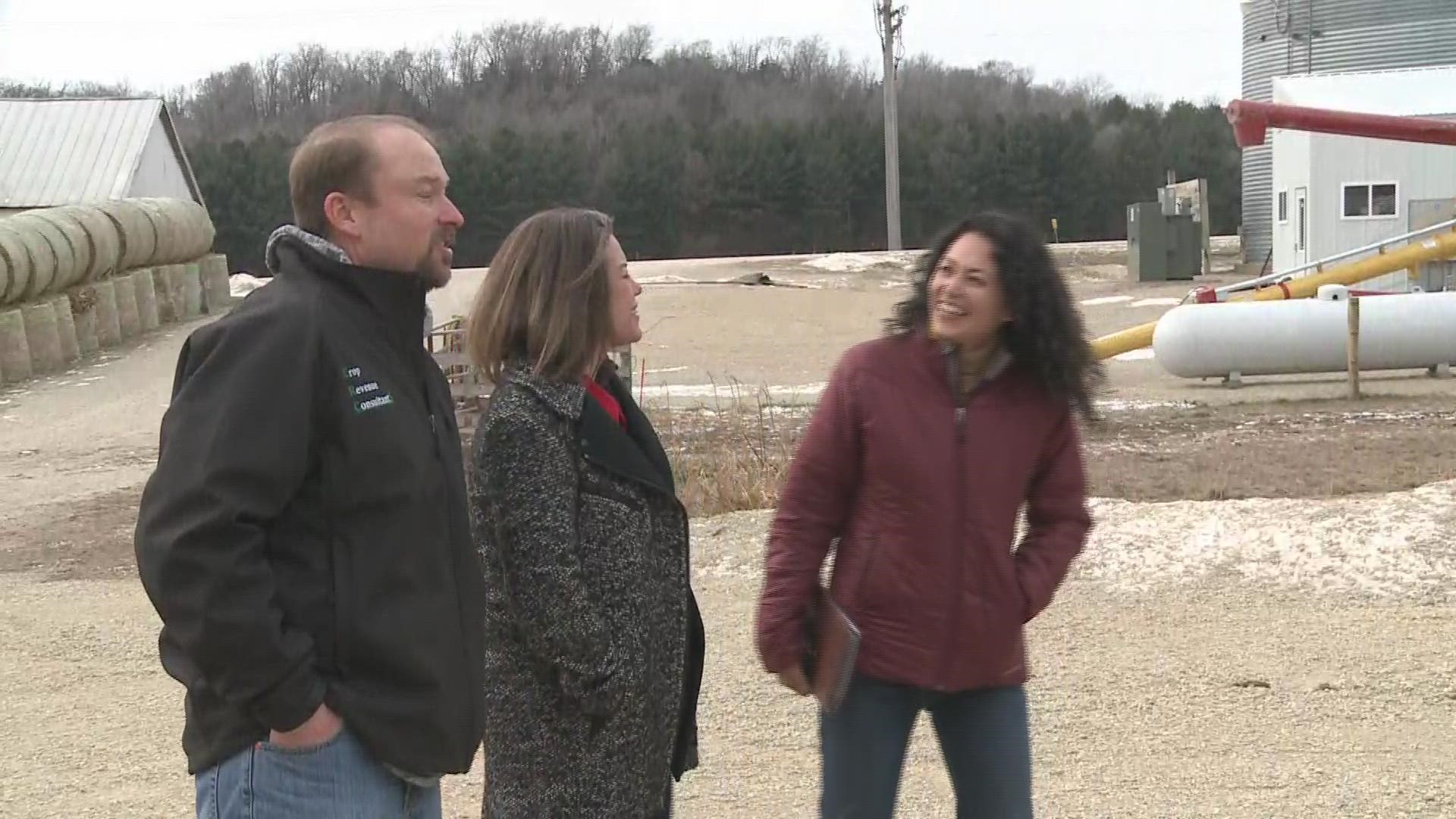CANNON FALLS, Minnesota — The main ingredients in ethanol and biodiesel are grown on farms, but the federal government has a role to play in making it easier for people who want to buy those products to get them.
That was one of the key takeaways Friday when Xochitl Torres Small, the USDA Under Secretary for Rural Development, visited a farm west of Cannon Falls. U.S. Rep. Angie Craig invited Torres Small to Minnesota to hear from farm organization leaders on the importance of keeping biofuels in the green energy mix.
The hosts, Rob and Kelly Tate, grow corn and soybeans on their farm and leased land in the area. He said it's essential that government leaders not forget about biofuels as the nation moves to reduce its carbon footprint.
"The technology of making ethanol gets more efficient all the time. What they can get out of a bushel of corn today is quite a bit more than they did a few years ago," Tate told KARE.
"There’s a lot of talk about electric vehicles, but there’s a lot of infrastructure that’s got to happen to make electric vehicles feasible. Ethanol’s already there."
Rep. Craig said she agrees biofuels are an important part of the transition to greener energy, which was why she worked to get more biofuels infrastructure funding added to the $1 trillion Infrastructure Investment and Jobs Act passed by Congress in November.
"It’s not just biofuels for the sake of it, or for family farmers, but across Minnesota we see biofuels plants that employ thousands of Minnesotans," Craig remarked, also noting that the roads and bridges in the Infrastructure Act will also make transporting grain and biofuels safer.
Under Secretary Torres Small, a former member of Congress from New Mexico, the federal government is working to expand access to equipment companies need to market different blends of biofuels to consumers.
"This is about how we can support farmers to take on climate change in the ways they already know how to do," Torres Small told KARE.
"And that whatever fueling station you pull up to, that they've got that infrastructure, making sure that the smaller mom-and-pop shops are able to access the technology needed to get the biofuels to the pump."
The USDA announced earlier this month the agency is making $800 million available to support biofuel producers and infrastructure. That includes $700 million in economic relief for biofuel producers and help renewable fuel markets affected by the pandemic be restored. It's part of the new Biofuel Producer Program included in the Coronavirus Aid, Relief, and Economic Security Act, or CARES Act.
An additional $100 million will be spent to boost sales of higher blends of ethanol and biodiesel by expanding the infrastructure.
Craig said the proposed Build Back Better Act would do even more to help service stations install the equipment to sell E15 and other ethanol products. She has also authored legislation that would make E15 available year-round.
As part of the stop at the Tate farm, Craig and Torres Small watched as a grain hauling truck took on 950 bushels of corn from a metal bin. The corn was destined for the Al-Corn Clean Fuel, an ethanol plant 40 miles away in Claremont, Minn.
The Tates said they welcomed the opportunity to host the event, which also included a panel discussion with major farm groups and Minnesota Agriculture Commissioner Thom Petersen.
Kelly Tate said that was one of the reasons her husband Rob wanted to serve on the Minnesota Corn Growers Association Board.
"Rob started on the Corn Growers to advocate and educate people about our way of life," Kelly explained.
"I think that’s really important for our kids, for people, to understand what they’re doing, what we're trying to give to them."
Minnesota farmers in the past several years have dealt with one extra challenge after another -- Chinese tariffs on soybeans, the COVID pandemic and the 2021 drought.
On a positive note the Biden Administration hasn't issued nearly as many waivers to small refineries that let them get around federal renewable energy standards.
"I'm really glad to say we are not seeing the so-called 'small refinery' waivers from this administration. The RVO targets, the Renewable Volume Obligation targets, for 2022 look very good," Craig explained.

